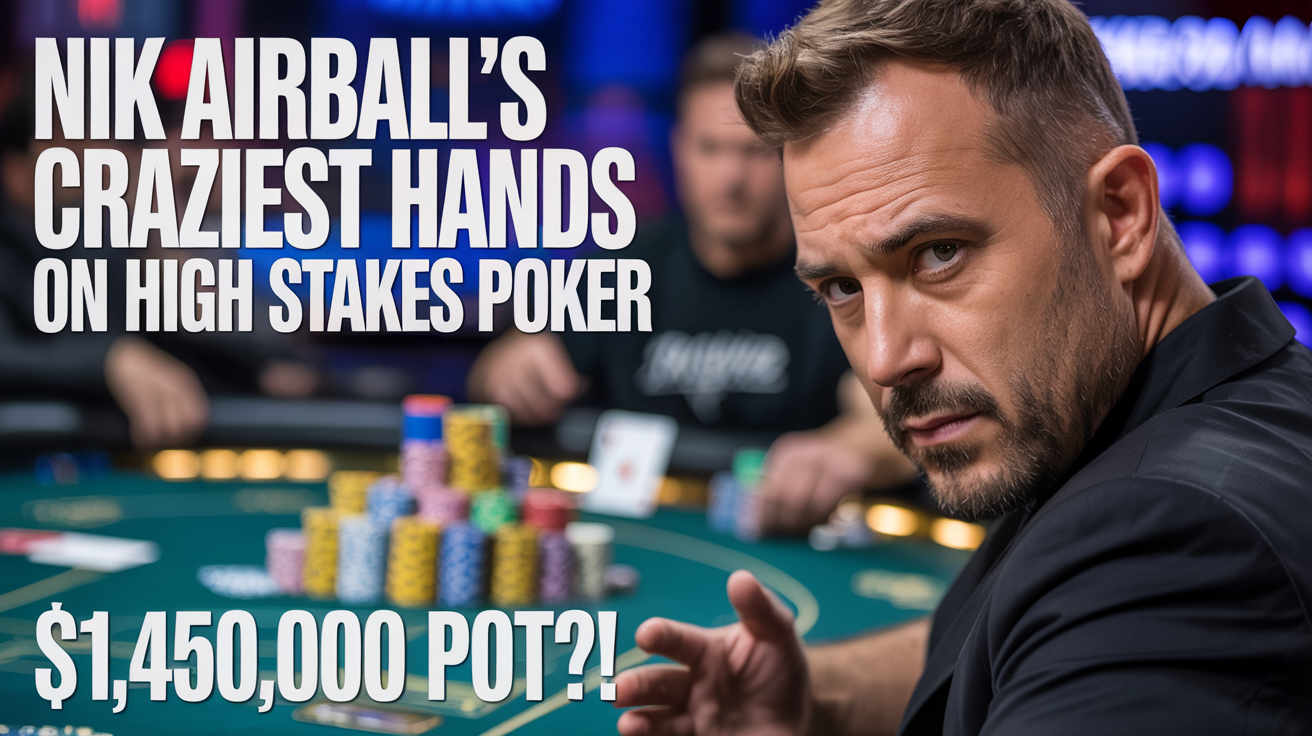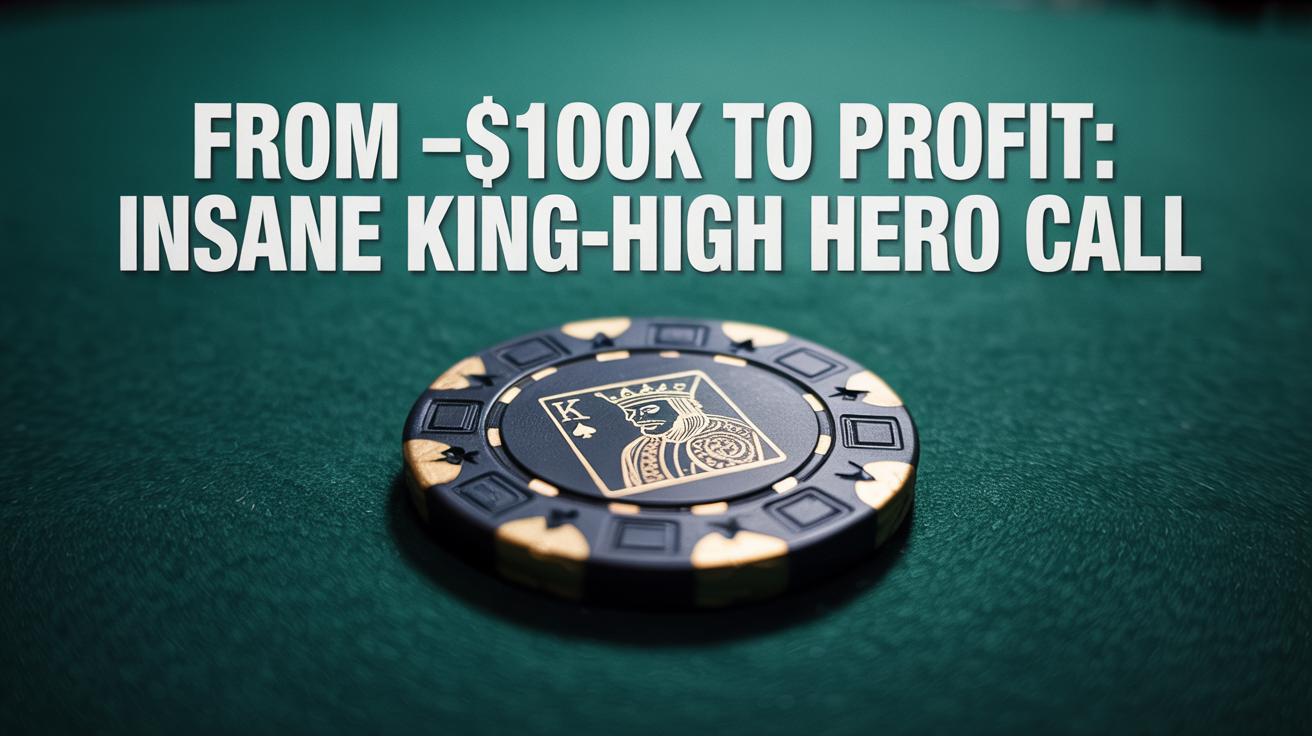The hum of Aria’s poker room carries a kind of electricity that only uncapped stakes can produce. Chips shuffle, dealers pitch with metronomic precision, and table talk skims the line between camaraderie and combat. The game is 25–25–50, uncapped, the kind of lineup where ranges widen under pressure and punishments arrive quickly for hesitation. After more than a month away—and a bruising forty-thousand loss at 100–200 in Bellagio—Brad buys in for ten thousand with a plan that sounds modest on paper: feel the room out, find the spots, and grind back toward even footing. Plans don’t always survive first contact. The lineup is sharp. The money is deep. The deck asks for an answer stronger than caution.
First Contact: Top Pair, Tough River
King-queen offsuit in the big blind looks comfortable against a button open from Alex, the “English Bulldog,” a nosebleed regular with a reputation for pressure. The straddler completes, and three see a flop of king, five, three with two clubs. Top pair, decent kicker, a board texture that rewards initiative or traps with equal clarity. Brad checks, the button checks back, and the turn nine of hearts introduces a second flush draw. Under the gun probes for three-fifty, the button calls, and the check-raise to thirteen hundred trims the field to heads-up. The river is the deuce of hearts, completing backdoor hearts, and a check induces a check-back that seems like relief until the showdown shows a quiet river loss. It’s a small sting that speaks loudly: in this room, even well-constructed lines sometimes get outkicked at the tape.
A Side-Table Omen and the Power of Flow
Relief has a way of arriving from next door. Ryan Tosic—bracelet winner, WPT champion, over $5.5 million in live cashes—drags a healthy pot with aces against ace-king at 5–10–20. It’s not Brad’s money, but it’s a reminder that big pots still break your way when you keep putting yourself in good spots. On nights like this, small omens matter.
The Bounty That Bends Ranges
A home-game twist hangs over the table: win three hands in a row and you collect three hundred dollars from each opponent. A fourth straight win escalates to four hundred, a fifth to five hundred, and so on. Incentives shift. Marginal calls gain hidden equity. Steals pick up extra value. Benton, two buttons deep, aims for his third. Brad opens the hijack to one-fifty, gets two callers and the straddler, then faces an ace-king-four two-spade flop that belongs to the preflop raiser. A four-hundred-twenty-five continuation bet leverages range advantage and denies draws. When the turn comes nine of diamonds, the over-pot bet to a thousand makes it expensive to chase both the board and the bounty. Two folds later, the streak is snuffed, the side money protected, and a message sent: in this room, pressure meets pressure.
Carnival of Variance: The Double-Board Bomb Pot
Eight-handed, everyone tosses in a hundred and sees two PLO flops. The top board is six-five-three; the second, ten-ten-four with two diamonds. With ten-nine, six-deuce—two spades—Brad holds top pair plus gutter above and trips with a weak kicker below. The button’s three-hundred bet narrows the field, and the turns complicate everything: nine of spades on top adds top two plus a flush draw; queen of hearts below opens up queen-ten disasters. A thirteen-hundred bet swells the pot. Calling preserves options, but the rivers punish optimism—the deuce of clubs completes too many straights up top, the queen of spades paints a likely winner below. A four-thousand cap bet arrives and folding is the only sane answer. Two thousand slips away, not as catastrophe but as tuition for riding PLO’s roller coaster.
Squeeze and Punish: The King-Ten Lesson
Back to hold’em, king-ten suited sits in the big blind behind a hijack open and three flats, the exact recipe for a squeeze. The thousand-dollar three-bet looks poised to clean up dead money until the cutoff unveils a rare back four-bet to twenty-eight hundred. Without position or clarity, king-ten suited becomes an expensive curiosity. Folding costs another thousand and adds a bruise to the ledger. The session drifts to negative three thousand and away from a comfortable groove.
Reasserting Threat: Ace-King as an Answer
Two hands later, ace-king on the button arrives like a rescue. The small blind three-bets to six hundred, and with roughly sixty-nine blinds effective, the best way to avoid flipping is to prevent it. Brad shoves for sixty-three hundred more. The tank tells the story: no aces, no kings, likely a pocket pair that hates its life. The fold restores more than chips. It restores posture. Even so, with the whole table covering him, playing shallow invites awkward pot-to-stack ratios. A five-thousand add-on pushes total exposure to fifteen thousand and returns the comfort of depth that makes the rest of the playbook available.
Top and Bottom: Using the Bounty Against Itself
In the under-the-gun straddle, ace-nine offsuit faces a button raise and a big blind call from a player chasing a third straight win. Having already paid one bounty tonight, Brad completes. The flop is ace-queen-nine with two diamonds, a dream for top and bottom with backdoor diamond potential. The button checks back after checks from the blinds, signaling capped strength. The turn king of diamonds introduces the front-door flush and a high-card scare for the straddle’s range. Check, three-hundred bet from the button, a cold-call from the big blind, and then the check-raise to fifteen hundred reopens the hand with authority. The button calls and the big blind yields. The river ten of spades brings four to Broadway, and discipline wins out over vanity. Check-check, two pair is good, and the button reveals a worse two pair with king-queen. The turn plan taxed ranges and rescued a pot while cutting off a bounty shot.
The Hand That Defines the Night: King-Eight and a Turn Jam
Under-the-gun plus two is new, wild, and craving side money. He opens to one-fifty, the big blind three-bets to eight hundred, and king-eight of hearts arrives on the button. In a vacuum it’s a fold. In this ecosystem, with an opener incentivized to be light and a three-bettor attacking that lightness, position turns king-eight suited into a speculative call. Three see eight-five-three rainbow. The big blind checks, under-the-gun plus two fires two thousand. Folding top pair to a single bet in position against a pressure profile is too tight. Brad calls, the big blind quietly exits. The turn five of diamonds pairs the board, blocks sets, and offers backdoor diamonds to bluffers. The bet is five thousand into a pot gone heavy. With ninety-six hundred total, calling leaves forty-six hundred behind and scripts the river as a coin flip between courage and capitulation. The shove goes in. The logic is clear: true overpairs snap; slow tanks belong to hands without a clean plan. After a long count, the call comes. The river four of spades dodges diamonds and most nightmares. The opponent mucks. The stack doubles. More than the dollars, it’s the manner of the win that matters—courage tethered to logic at the precise hinge of the session.
Top Set, Small Rope, Big Pot
Twelve minutes later, pocket eights under the gun plus one meet three callers and an eight-three-deuce two-diamond flop that hides in plain sight for an early-position raiser. Betting four hundred tests curiosity. Under-the-gun plus two bows out, the small blind continues, and the big blind releases. The turn king of hearts triggers an eight-hundred lead from the small blind, a line that smells like top pair or a draw more than a buried monster. With fifty-seven hundred behind, Brad raises to two thousand, a number that invites worse hands to continue and sets up a natural river shove. The small blind calls. The river king of spades brings the boat for Brad and a check from the small blind. A single five-thousand chip slides out to cover thirty-seven hundred more. Snap-fold. No stack-off, but plenty of value, and the profit line climbs into five figures.
Multiway, No Romances: Eight-Six Suited and the Check-Raise
Straddling under the gun with eight-six suited, Brad faces an early raise and a caravan of callers to see an eight-six-three rainbow flop. It looks safe but hides pitfalls in numbers. The preflop raiser bets four hundred seventy-five into five opponents; two calls sandwich Brad. Slow-playing invites free chances for gutshots and overcards. A three-thousand check-raise isolates strength, forces honest ranges, and closes the door on speculative floats. Folds come in waves. A neighbor quietly confesses he folded pocket aces. Against a single opponent the line might have been different, but six-way flops demand price-of-admission enforcement.
Top Two Shrinks on a Four-Diamond River
Ace-seven suited under the gun plus one earns four callers and an ace-seven-four two-diamond flop that hands Brad top two and a denial mandate. Four hundred fifty goes in and the small blind chases his third straight victory. The big blind and under the gun step aside. The turn deuce of diamonds completes front-door diamonds and wakes up five-three straights. Betting eight hundred charges single-diamond floats and keeps worse aces honest. The river nine of diamonds lays the fourth diamond on the cloth, and discretion replaces ambition. Check-back meets a reveal of six-five offsuit with the six of diamonds, a shape-shifting float that found its way home. The pot plus a bonus payment leaves, a reminder that even clean flops can become rhetorical questions by the river.
Thin Edge, Thick Spine: Four-Betting Pocket Nines
Near midnight, pocket nines under the gun plus one face a loose cutoff call from Benton on a bounty hunt and a button three-bet to twelve hundred from the same opponent who back four-bet earlier. Calling out of position invites awkward runouts. Folding concedes too much. With stacks insufficient to justify set-mining and a read that the button’s sizing is inflated by the situation, Brad reaches for a line he rarely selects in cash games: the four-bet to three thousand. The cutoff steps away, and the button snaps a fold. Nearly fifteen hundred slides across the line, and the table recalibrates. Thin edges exist because someone has the spine to lean on them.
The Table Breaks and the Ledger Speaks
After about five and a half hours, the game dissolves. The racks fill. The count settles at plus twelve thousand seven hundred. The number matters, but the story engraved in it matters more: the return to form after fear, the willingness to escalate in spots others would smooth out, the patience to check back on poisoned rivers, and the clarity to add on when depth would reduce future mistakes.
Strategy Threads Woven Through the Night
Trap lines only sing when your opponent believes the story. The king-queen check-raise worked in every way but the result because the button’s range withheld strength until the river rerouted the ending. Overbets on innocuous turns build leverage and tax draws; the ace-king-four-nine hand proves how size can keep the initiative where it belongs. Multiway pots punish romance and reward enforcement; the eight-six check-raise is textbook range corralling. PLO bomb pots aren’t about having equity; they’re about realizing it. Folding capped rivers that complete too many lines isn’t nitty, it’s necessary. Rare back four-bets into squeezes announce a plan to punish reputation; the lesson sits inside the lost thousand, not in the bruise to ego. Shoving ace-king at shallow effective stacks isn’t “taking a flip,” it’s preempting a worse one. Turn jams, like the king-eight shove, win nights because they target capped ranges with an image honed by earlier bets. Thin four-bets with middle pairs can be correct when the three-bettor’s range is bloated by dynamics and pressure.
The Psychology of Coming Back
A layoff and a downswing conspire to whisper bad advice. They tell you to avoid friction, to shrug off edges, to defer risk until variance promises a smoother landing. The night’s arc rejects that whisper. Buying in for ten and adding five wasn’t spew; it was control, a vote for the full playbook over a shortened script. The early river loss didn’t trigger a chase; it drew a boundary. The ace-king shove reasserted threat instead of nursing stack size. The king-eight call preflop and turn jam honored both profile read and stack geometry. The check-back with top two on a four-diamond river avoided vanity. The pocket nines four-bet kept the initiative in a spot where calling would have turned the hand into a hope-and-pray exercise. Each choice reclaimed identity from the month’s absence and the Bellagio bruise.
Incentives, Ecosystems, and Why the Bonus Matters
The two-button bounty warped ranges all night. Players stretched preflop opens, defended too liberally, and chased turn cards that carried side equity. Others, seeing the stretch, countered with heavier three-bets and well-timed four-bets. The king-eight hand is the clearest product of that ecosystem: a lighter open, an attack on that lightness, and a call that leverages position to punish both incentives. Strategy is not static. It breathes with the room’s quirks.
A Night You Carry Forward
When the last chip clicks into the rack and the neon of the Aria hallway washes the felt from your eyes, what lingers isn’t only the total. It’s the proof of concept. A month out did not erode reads. A bad prior session did not redefine your ceiling. The biggest pot of the night did not materialize from luck alone; it took a call that recognized where ranges live and a shove that exploited where they falter. The biggest value hand did not require a cooler; it needed sizing that coaxed, then cornered. The most delicate fold did not announce weakness; it protected a lead that would matter later.
The Hand That Explains Everything
If there’s a single frame that captures the night, it’s not the top set that held or the ace-king shove that regained posture. It’s king-eight suited on eight-five-three rainbow. A wild opener diluted by bounty money. A three-bettor leaning on that dilution. A call that accepts responsibility for later streets. A turn barrel into a paired board that blocks sets and opens bluff canvases. A shove that reads tank time as weakness, not trap. A river that cooperates. A muck across the line. Courage without recklessness. Logic without paralysis. That one hand is the night in miniature: an answer to pressure that neither overreacts nor retreats.
The Quiet Epilogue
There’s life beyond the felt in this story too. Idaho waits with a cousin’s wedding and family faces. Friends and familiar grinders share rails and smiles. Ryan’s aces get paid on a different table, a reminder that the poker universe is broad enough for many wins at once. Viewers are invited to suggest filming-friendly rooms for future stops. A one-hundred-thousand freeroll on Gold sits in the channel’s orbit for those who use Brad’s name when joining. The sign-off is simple and sincere: hope you’re safe, good luck at the tables. A kid named Henry says goodbye, and the camera fades.
What the Ledger Leaves Behind
The plus twelve thousand seven hundred isn’t a grand redemption arc. It’s something sturdier. It’s a stitched seam after a tear, a repaired tool after a drop. Tomorrow will bring new lineups, new bomb pots, new rivers that test your stomach. But tonight was proof that the instincts are still sharp, that the courage is still calibrated, and that the playbook still works against a room that demands your best. Nights like this don’t make legends. They make careers.






